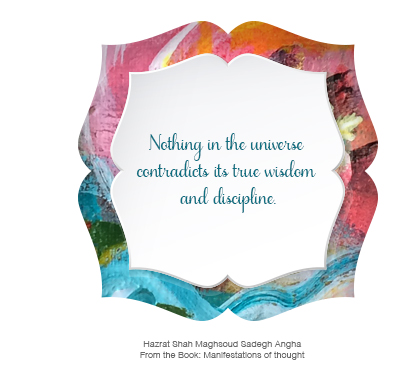Zikr: Remembrance
"Remember Me, I will remember you"
(Holy Qur'an, 2:152)
"Those who believe, and whose hearts find comfort in the remembrance of God- for, verily, in the remembrance of God hearts do find peace and comfort."
(Holy Qur'an, 13:28)
The literal meaning of Zikr is “remembrance,” specifically remembrance of the Beloved. Hazrat Amir al-Mo'menin Ali (pbuh) says: "Zikr is the joy of lovers, the light, the growth and key of acquaintance."1
Hazrat Molana Shah Maghsoud Sadegh Angha stated: "Zikr is that by which a person seeks closeness to God. Therefore the Zikr of the common man is in affirmation of the presence of God through words of prayer, whereas the Zikr of the Elect is the annihilation of the witness in the witnessed."
Imam Ja’far Sadegh (pbuh) has said:
"Pure is He who has deemed:
- the heart of the Arif (Gnostic, Sufi) to be the vessel of Zikr,
- the heart of pious the vessel of reliance and trust,
- the heart of the believer the vessel of satisfaction,
- the heart of the meek the vessel of contentment, and
- the heart of the worldly the vessel of greed." 2
According to Hazrat Shah Maghsoud Sadegh Angha, Zikr is the constancy of the Light of Knowledge in the presence of the Heart and in the discovery of Truth in the hidden realms. It is the reality of the seeker’s journey from the outer worlds within.
Zikr harmonizes the human instrument to the tune of God’s remembrance. If done correctly, Zikr frees the seeker from daily distractions, thoughts, fears and worries by uniting every aspect of their being in remembrance of God. The seeker’s only goal is to connect to his heart, allowing the natural rhythm and flow of Zikr to free him from worldly attachments.
By moving from left to right, the rhythm and motion of Zikr are dictated by the heart in the form of the infinity sign. One moves from left to right making the figure eight (∞) to represent the scientific symbol of infinity while singing the specific phrase or verse. At the center of this infinity sign is the heart where total concentration must reside to experience the reality within and connect to the true self, the "I". This practice activates the energy centers in the body, beginning the process of purification of the heart.
Remembrance of God through Zikr allows the seeker to forget everything but God.
God Almighty has said:
"My servant endlessly seeks closeness to Me through sacrifice so that I may love him; so when I love him, I shall be the eyes with which he sees, and the ears with which he hears, the tongue with which he speaks, the hands with which he holds, the steps with which he endeavors; thus he shall see by Me, and he shall hear by Me, and he shall speak by Me, and he shall hold by Me, and he shall endeavor by Me, and if he should ask My help I shall guide him, and if he should call Me, I shall answer him."
The Prophet Mohammad (pbuh) has said: "Ghulu (say in plural): La-illaha- Illa- Allah, and be saved. "The word 'Ghulu' is in plural, meaning saying the phrase with one’s tongue, body, mind, and heart in its totality. Every part is aspiring to God: the mind is focused on God, the word spoken is God, the ears hear the melody of the heart, the heart dictates the movement of infinity, and the body moves harmoniously from left to right, swaying to the natural rhythm of the heart. In fact, Zikr is inspired by the heart, the source of Life, where we find our true identity, and where the path to God may be found.3
